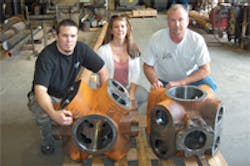Paul Precision Machine Inc., a Tulsa machine shop, specializes at machining ductile iron cylinder castings, steeple cylinders and crosshead guides for natural gas compressors. High-pressure coolant flushing is required, as the Paul machining centers accommodate large work envelopes. The shop had a recurring and costly problem resulting from such heavy-duty machining. Coolant nozzle clogging that followed filters clogged with cast iron fines created immediate problems in coolant delivery to the large workpieces.
Machining cast iron produces a large volume of small particles, known as fines. These particles are often in the 25-to100-micron range, well below a typical machine tool filter system’s capabilities. This causes sludge to accumulate in the chip conveyor’s coolant tank and the filter vessel. When clogging occurs, the machine requires substantial downtime and loss of production, as the sludge is literally shoveled out of the system.
“Every 80 to 100 hours, our big machining centers were going down,” explained Chuck Paul, company founder and president. “We had to stop production, completely break down the system, clean and replace parts, reassemble and get back to business. This process usually took from eight to 12 hours, resulting in a substantial loss of revenue, in addition to pushing back our production schedule every two weeks or so.”
While attending a machinetool show, Chuck’s son Kevin found a magnetic chip disc filtration system manufactured by Hennig Inc. designed to handle fines from cast iron machining. After 60 days of conversation and drawing exchanges, the decision was made and the first Hennig Cast Iron CDF Filtration System (CICDF) was installed on one of Paul’s 600-mm Okuma machining centers. Installing the Hennig CICDF was a relatively low-impact process for Paul, as the system uses the machine tool controls, interconnected to a manual auto-switch, so it runs whenever the machine tool is in operation. Through the first four months of operation, no machining-center downtime occurred as a result of canister filter clogging. Paul notes the Hennig CICDF system performs equally well on all materials, even non-ferrous.
On the Hennig CICDF, the dirty coolant is channeled to the conveyor where the big chips and larger particles are conveyed up an incline and discharged into the chip hopper. Then, smaller cast-iron fines are collected by a magnetic drum that rotates across a stainless steel scraper blade. As the sludge accumulates on the scraper blade, it drops the fines onto the conveyor incline with the chip load for delivery to the chip hopper. Finally, the smallest particles that escape the magnetic field of the drum migrate to a disc filter media made from a micronic weave of stainless steel mesh that intercepts particles as small as 25 microns. A continuous backwash of coolant blasts the particles collected on the disc back to the magnetic drum, where they are scraped off as sludge, eventually dropping onto the conveyor incline and carried out with the chip load. The disc filter is sealed with an inverted lip seal on the clean side of the conveyor wall, where the fines and contaminants cannot interfere with sealing, so a consistently tight seal and long seal life is assured. Paul also reports longer coolant life and less heat build-up as other benefits of the system. Only clean coolant returns to the reservoir for continuing duty on the machine tool, or it is diverted to the system’s selfcleaning spray nozzles.
Paul admits he experienced some “sticker shock” at the cost of the first system, until he calculated the payback time to be 14 to 16 months on a machining center running one 10-hour shift per work day. And, that calculation accounted only for the machine tool’s billing rate.
With the additional uptime and better predictability on his work schedule, Paul was able to improve turnaround time on jobs and not have to make the almost bi-weekly adjustments caused by the former system. As a result, an additional Hennig CICDF has been installed and a third is scheduled. “Compared with the alternatives of a vacuum cleaning system or the changeover and hazmat disposal problems of conventional paper media, there are substantial cost and other benefits to the Hennig magnetic drum system,” said Paul.
